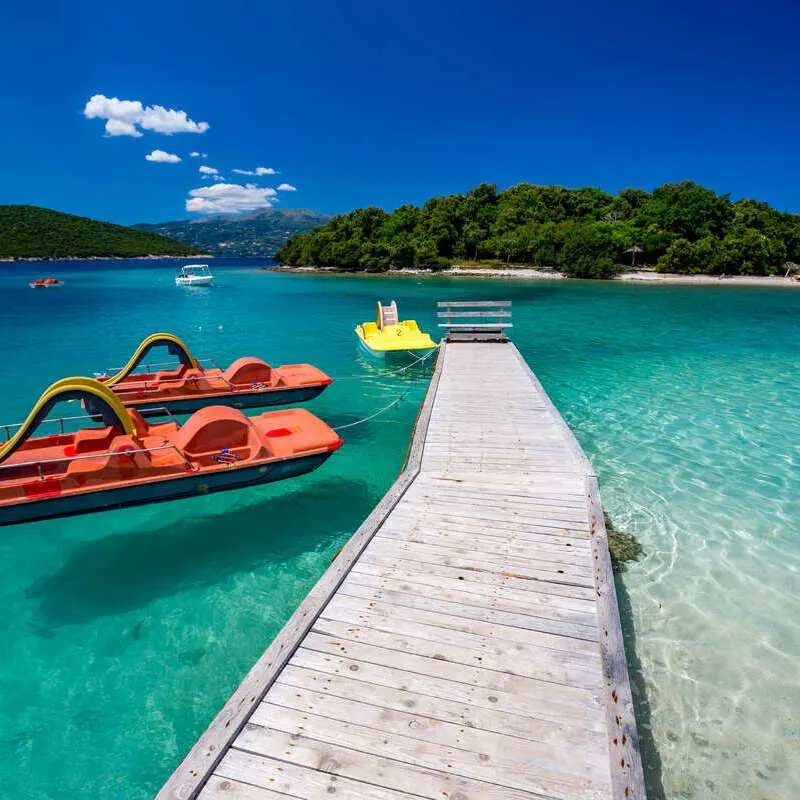Last Updated
With national governments easing border curbs for digital nomads and some going as far as competing for the title of nomad hotspot while launching migration routes unique to the category, you may feel as if there are (far too many) options at hand already.
Which so many digital nomad residency permits available and multiple countries relaxing visa requirements, which are some of the best destinations for remote workers?

Why Affordability And Culture Are Important
As part of the community ourselves, when picking a new base, we normally take into account factors like affordability and the cultural aspect.
For instance, though it is an intriguing metropolis and a microcosm for the East-West divide, Hong Kong wouldn’t rank high on our list of nomad-friendly spots due to its strict residency rules, expensive cost of living, and eroding democracy.
The same applies to a number of European and Latin American destinations: who wouldn’t love to live in charming, heart-of-Europe Paris? French cuisine is an immaterial world heritage, the architecture is stupendously beautiful, and the vibes romantic, immaculate.

Or then, tropical Rio de Janeiro, where glitzy beachfront apartment blocks are interspersed with Atlantic forest and bounded by an azure Atlantic, and consumer prices are extremely low compared to much of the Northern hemisphere?
The downsides to those? Paris is one of the most expensive nomad destinations worldwide, where you are expected to earn on average US$5,307 monthly to make a decent living, and as for Rio, it is not exactly tourist-friendly by any standards, with crime being rampant.
Where, then, should you go that ticks all of these boxes?
- It has a vast cultural offer and wide range of attractions
- Good to great nomad infrastructure
- Easy to relocate to
- Safety levels are either ok or high

We have 5 picks:
Mexico
The most obvious pick for American nomads, Mexico’s biggest appeal is its diversity, as the country combines elements of the Hispanic World, owing to its background of Spanish colonization and much earlier pre-Columbian civilizations.
Cities like Mexico City (CDMX) offer long-term residents a plethora of coworking spaces and artsy trendy districts to explore; at the same time, those choosing to relocate to the Mayan Riviera instead get to live by the seaside and within driving distance of a number of prominent historical landmarks.

Other up-and-coming destinations include the state of Baja California Sur, on the Mexican Pacific, a favorite among nomads looking for a more peaceful, quieter alternative to the bustling Caribbean coast, and the inland historic cities of Guanajuato and Guadalajara.
Away from the major tourist hotspots like Cancun and Los Cabos, Mexico is also relatively affordable to live in, with NomadList estimating monthly expenses to be US$2,314, though these can vary wildly depending on city/state.
Finally, Mexican cities are not any more dangerous than the average large urban center in the United States, with the Mexican President claiming himself it is actually ‘safer’, and authorities allow most foreigners to remain in the national territory for up to six months visa-free.

Georgia
The rising star of the digital nomad scene, Georgia (the country) is a lesser-known sovereign state in the Caucasus, an ambiguous territory nestled between Europe’s far East and Western Asia.
Historically, it’s always been a poorer country, having remained under Russian control for much of its modern existence, but following its full transition into a democracy in the early nineties and pursuit of closer ties to Europe, it started becoming more attractive to potential migrants.
As a land, Georgia is simply mesmerizing, being bounded by the majestic snow-capped Caucasus peaks to the North, marking the natural boundary between Europe and Asia, straddling the shores of the warm, bright-blue, misleadingly-titled Black Sea, and boasting a verdant, fertile hinterland.

Not only is Georgian nature a force to be reckoned with, but its national capital, the charming Tbilisi, has been recently dubbed the Eurasian Capital for Digital Nomads, owing to its vast selection of nomad-friendly cafes and coworking centers, the friendliness of locals, and high affordability.
Staying in Old Town Tbilisi, the prettiest district, jam-packed with medieval structures and colorful heritage mansions, remote workers looking to live comfortably by themselves in a well-equipped, centrally-located flat and treat themselves to nice dinners are expected to budget only US$2,217 monthly.
Other nomad ‘centers’ include the seaside resort of Batumi, where prices are roughly the same, and the equally fascinating ancient city of Kutaisi.

Fortunately for nomads, they can stay in Georgia for up to one year visa-free, though they are automatically liable for income tax after 183 days.
Thailand
Over in Southeast Asia, Thailand is one of the world’s fastest-growing nomad destinations for a reason – well, several reasons.
First of all, it is warm all year long, and other than the rainy season – which is a temporary nuisance more than anything – it will certainly help you beat those winter blues in the Northeastern U.S. or Canada, whether you’re based in Bangkok or a tropical island on the Gulf of Thailand.

Speaking of Bangkok, you should probably know it is ranked number one for Digital Nomad Cities on NomadList, with a more-than-perfect score of 5.08/5.
This means you are extremely likely to approve of Thailand as a destination in your capacity as a remote worker.
Thailand is extremely affordable in general, and Bangkok itself, supposedly one of the most expensive destinations in the country – it is, after all, the sprawling capital and a major financial hub – will only set you back by around US$1,419 a month.
Further North, in the increasingly popular Chiang Mai, a UNESCO-listed historic city famous for its protective, moated Old Town, an average meal will cost you on average a negligible US$4.18, and you may find kerbside foot and shoulder massagists for a very reasonable US$7.04.

Prices may double in seaside resorts like Phuket Island and Pattaya, as they cater mostly to vacationers and short-term visitors with money to splurge, but all in all, Thailand remains a remarkable budget ‘workcation’ by any standards.
Recently, Thailand has announced the rollout of a Digital Nomad Visa, promising to make relocation and long-term residence easier for those interested.
Turkiye
Sitting atop the natural border between Europe and Asia, Turkiye (formerly spelled Turkey) has always been Europe’s go-to summer and winter sun destination.

Since it reopened its borders, however, it’s been attracting a new niche of visitors, and they are unlikely to leave anytime soon.
Digital nomads love Turkiye for its gorgeous Aegean and Eastern Mediterranean coastlines, dotted with quaint seaside villages, exciting city breaks, natural wealth, and of course, its low cost of living. In case you weren’t aware, it is one of the cheapest nomad destinations in Eurasia.
This is due to the depreciation of the Turkish lira, which has been getting progressively weaker against an ultra-valued dollar and giving Americans more purchasing power when residing in Turkiye for prolonged periods of time.

Some of the best cities to be a nomad in are Istanbul, the country’s most multicultural metropolis and an ancient gem we have written extensively about here; Antalya, a large city on the Mediterranean shoreline; Ankara, Turkiye’s vibrant inland capital; and Trabzon, the gateway to the Black Sea.
Regrettably, Turkiye has more restrictive visa rules than other countries on this list, requiring U.S. passport holders to apply for an eVisa ahead of visiting, but once approved, which is the likely outcome in practically 100% of cases, they can stay for 3 months as short-term tourists.
Those wishing to reside in Turkiye for longer must apply for a Residence Permit on other grounds, as Turkiye does not yet have a Digital Nomad Visa in place.

In general, authorities are not opposed to migration from the U.S. or Europe, which makes obtaining a long-term visa easier.
Albania
The final entry on this list, Albania was Europe’s underdog nation and its last hidden gem before it went viral all over TikTok last year, and tourists started flooding into its Adriatic beaches from all over the world, but that doesn’t mean it has been spoiled – not yet.
Unlike a majority of European countries, Albania is neither in the European Union nor the Schengen Zone.

This means they apply their own visa rules, and the Immigration Authority is not at all strict when it comes to long-term stays, especially when it’s Americans.
U.S. citizens can stay in Albania for a whole year visa-free, and you may be wondering why you should exactly, seeing it’s an unheard-of small Balkan nation.
If this article doesn’t inspire you to pack your bags and get the next plane out to Tirana, let us just reiterate that Albania is one of the most beautiful yet overlooked European countries.

It has 476 km of pristine coastline, hugged by the teal-colored waters of the Adriatic, a subdivision of the Mediterranean, crowd-free, fairytale UNESCO-listed towns dating back centuries, such as Berat and Gjirokaster, a quirky, unusually-modern national capital in Tirana, and a flavorful ethnic cuisine.
Tirana itself is a self-proclaimed European Capital for Digital Nomads, with its numerous internet cafes and low consumer prices.
It even hosted a nomad conference last year, which we attended ourselves and have been able to evaluate, firsthand, the infrastructure put in place for the community.

On average, you can live a pretty decent life in Albania, earning US$2,010 monthly, as verified by NomadList, and quite frankly, considering the amazing culture, breathtaking coastal views, and temperate climate – the Albanian coast is generally warmer than other European destinations in winter – we’re not sure we’d ever want to leave.
Read More:
Top 5 Travel Insurance Plans For 2023 Starting At $10 Per Week
How To Easily Earn Points For Free Travel

SUBSCRIBE TO OUR LATEST POSTS
Enter your email address to subscribe to Travel Off Path’s latest breaking travel news, straight to your inbox.
This article originally appeared on TravelOffPath.com





